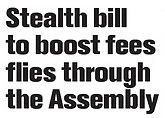The one, and perhaps only, hard piece of accountability that has come out of the widening US Attorney scandal is that the Congress passed legislation striking out the provision in the PATRIOT Act that allowed the Justice Department to appoint replacement federal prosecutors without seeking Senate confirmation. The new law passed in both Houses with expansive, veto-proof majorities (94-2 in the Senate, 306-114 in the House). Any veto would be overridden, so the President has no choice but to sign the bill.
Except he hasn’t yet, and the hip-pocket veto has enabled Abu G to strike again – right in our own backyard of Los Angeles.
In a Senate Judiciary Committee business meeting Thursday morning, Senator Patrick Leahy (D-VT) revealed that Attorney General Alberto Gonzales once again used an interim appointment authority at the heart of the US Attorneys controversy that Congress banned in a bill sent to the President for signature on June 4 […]
Tracy Schmaler, a spokeswoman for Senator Leahy, clarified the situation in an e-mail to RAW STORY.
“It just so happens the committee got notice yesterday, that on June 16, George Cardona’s 210 days as Acting U.S. Attorney in the Central District of California will have run out and the Attorney General will appoint him as an interim U.S. Attorney at that time. (i.e. still using the end-run authority because Bush has slow-walked signing the bill),” she wrote.
The Cardona appointment is interesting, to say the least. It was reported in the LA Times just two weeks ago that a new hire for Cardona’s position was imminent. The Los Angeles DA Steve Cooley called the pick, Thomas O’Brien, “the most apolitical person selected to that job in quite some time.” Remember that the vacancy here was made by Debra Wong Yang’s departure to Republican law firm Gibson Dunn, the same firm whose client was Rep. Jerry Lewis, who Yang was investigating at the time.
So Lewis’ team had already bought out Yang (allegedly!), and now they were faced with the prospect of a hard-charging independent former DA in the role. That must not have sat well with him. So did Lewis tell the Justice Department to keep their handpicked loyalist in place until he made his way out of Congress (he’s rumored to be retiring)?
Marcy Wheeler also sees another angle here.
Finally, the move is especially curious because Gerry Parsky, a bigwig Republican who heads a Commission that picks judicial appointees in CA, has been particularly cranky about being left out of the process of naming USAs. And DOJ already went around him on this position specifically.
Once Yang resigned in November to pursue private law practice, it was up to the commission to make recommendations to the White House and the Justice Department. But Sampson and Goodling tried to generate candidates of their own. Interviews were scheduled with half a dozen people, many of whom had held political appointments in the department.
Parsky did not respond to e-mailed questions about his role in the process.
After word of the interview schedule leaked, Parsky called the White House and the Justice Department to complain, according to a person familiar with the process who requested anonymity because it involves a personnel matter. Goodling was allowed to proceed with the interviews, but was told she had to tell the candidates that they would have to reapply through the commission.
Ultimately, the commission is believed to have recommended two candidates; the only one interviewed by the Justice officials in Washington was a career prosecutor who has headed the criminal division of the Los Angeles office. The White House has not said whom it will nominate for the post.
Some people close to the selection process suspect Goodling and Sampson were attempting an end-run around the commission to install a politically connected Washington insider, possibly by using a law that permitted the attorney general to appoint interim U.S. attorneys without Senate oversight.
Indeed, Parsky was on board with the Thomas O’Brien appointment, according to the recent LA Times article. Until it all fell through.
What the hell’s going on here? Why is it so important to keep George Cardona in the Los Angeles USA seat, in defiance of a law passed by over 85% of Congress? Does this have to do with investigations of members of Congress like Lewis (and, potentially, Ken Calvert)? Will there be an effort to suppress the vote in the extremely ethnically diverse region, and must Cardona be the point person for that? It’s very, very curious.

